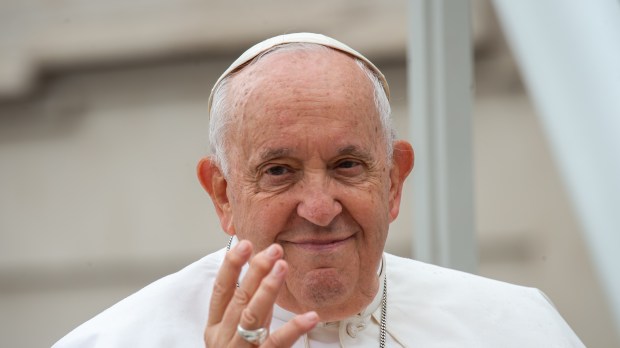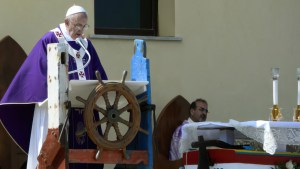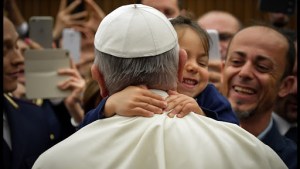The Pope’s trip to Marseille (but not France), possible trips to Argentina and Kosovo, diplomatic negotiations on Ukraine and Nicaragua… Pope Francis gave a long interview to the Spanish magazine Vida Nueva on the occasion of the publication’s 65th anniversary, August 4, 2023. Pope Francis also spoke about the Synod on Synodality and said that the Catholic Church today has no need of a Vatican Council III.
Cardinal Zuppi soon in Beijing for Ukraine
The publication asked about the peace mission of Cardinal Matteo Zuppi, the Pope’s envoy to Kiev, Moscow, and Washington at the beginning of the summer. The head of the Catholic Church confirmed that the Archbishop of Bologna and President of the Italian Bishops’ Conference may soon be heading for Beijing, China.
“After Cardinal Zuppi’s visit to Washington, the next planned stopover is Beijing, because both also hold the key to lowering the tension of the conflict,” the Holy Father explained, summing up the many actions taken recently as a “peace offensive.”
In his first speech in Portugal on August 2, the Pontiff made yet another appeal to Europe to seek prospects for peace in Ukraine.
In the course of the interview, the Argentine Pontiff conceded that Cardinal Zuppi had encountered diplomacy in Kiev that “maintained the idea of victory without opting for mediation.” In Russia, on the other hand, the Italian cardinal “found an attitude that could be described as diplomatic.”
Pope Francis reports that the most significant breakthrough concerns the return of Ukrainian children to their homeland. “We’re doing everything in our power to ensure that every family member calling for the return of their children can achieve it,” he says. On May 13, when President Zelensky came to Rome to meet Pope Francis, he asked the Vatican “to join Ukraine’s efforts to bring back Ukrainian children illegally and forcibly brought to Russia.”
In the interview, the Pope says he is considering appointing a permanent representative to act as a “bridge” between the Russian and Ukrainian authorities.
The Pontiff also announced that a peace meeting with religious leaders in Abu Dhabi was being prepared. It would be held before the United Nations climate summit in Dubai (November 30 to December 12). Cardinal Pietro Parolin, the Holy See’s Secretary of State, is coordinating the meeting. According to the Pope, the meeting will take place outside the Vatican, “in neutral territory.”
The Pope in Marseille, but not in France
“Even if I’m going to Marseille, I’m not going to France.” A few weeks ahead of his visit to the southern French port city on September 22 and 23 for the Mediterranean Meetings, Pope Francis reiterates that he does not consider this trip to be a visit to France. “I’m not going to any major European country until I’ve finished with the little ones,” he insists, ruling out the possibility of a trip to Spain.
In Marseilles, the program issued by the Holy See nevertheless provides for Pope Francis to be welcomed by French President Emmanuel Macron on his arrival. The following day, he will also hold private talks with the head of state.
In addition, the Pope will celebrate a Mass in the Velodrome stadium, where Catholics from all over France will be present.
A papal trip to Kosovo?
Asked about his next foreign trips, Pope Francis explains that a trip to Kosovo is under consideration. “But it’s not definite,” he immediately qualifies. In recent years, the Holy See has kept a close eye on the peace situation in the Western Balkans. Although an apostolic delegate has been appointed for Kosovo, the Holy See does not recognize the independence of this country, which took autonomy from Serbia in 2008.
Pope Francis also confirms that a trip to Argentina is “on the agenda.”
“We’ll see if it’s possible, once the election year is over,” he says. Argentina’s presidential election takes place next October. This would be a first for the Argentine Pontiff, who has not returned to his country since his election to the Throne of Peter in 2013.
Pope Francis had planned a trip to his country in 2017, on the occasion of a trip that would also take him to Chile and Uruguay, but had to postpone it due to elections in Chile. When he returned to Latin America for a trip to Chile and Peru in 2018, a trip to Argentina was no longer an option.
In Vida Nueva, the Pope says that this time he is thinking “only of Argentina” and “perhaps Uruguay.”
On Nicaragua and Bishop Rolando Álvarez
“We’re continuing, we’re trying to negotiate.” These are the words of Pope Francis when asked about the situation of this Nicaraguan bishop imprisoned for opposing President Daniel Ortega. Without giving any further details, he simply nodded when asked by journalists whether he had asked Brazilian President Lula da Silva to intercede with Daniel Ortega to free the bishop.
Rolando Alvarez, bishop of Matagalpa, was imprisoned and subjected to an accelerated trial after refusing to board the plane that was to deport him to the United States with 220 political prisoners deprived of their citizenship. He was sentenced to 26 years in prison last February.
No Vatican III in prospect
“Things are not ripe for a Vatican Council III,” the Pope assures the Spanish weekly. In his view, there would be no need for one at present, since Vatican II has not yet been fully implemented.
Since the beginning of his pontificate, the Pope has stressed that it takes time to “absorb” a Council, and that Vatican II would take a century to integrate.
In the interview, the Pope denounces the “fear” that has spread throughout the Church regarding acceptance of the Council, referring to the “old Catholics” who, at the time of the First Vatican Council, proclaimed themselves “depositaries of the true faith.”
Pope Francis also spoke at length about the Synod on Synodality, the first Roman session of which opens in October. He insists on the climate of prayer necessary for its success: “The protagonist is the Holy Spirit. Whoever does not believe in Him and does not pray during the Synod can go nowhere. […] They will come up with an ideology, a political position, but nothing real without a climate of prayer.”
And he guarantees, “If we are faithful, the Holy Spirit will push us where we cannot even imagine.”
He also looks back at previous synods, during which certain themes have been the subject of much debate, such as the ordination of married men during the Synod on Amazonia in 2019. “They talked about ‘viri probati,’ yes, but also about other important things, like the work of catechists, permanent deacons, regional seminaries, or the involvement of priests in the territories. These were advances that came from within, and in the end, the question of the ‘viri probati’ remained there.”
In the interview, Pope Francis once again criticizes the “rigidity” of some priests and seminarians. For him, although the rigidity is found in “good people who want to serve the Lord,” it is an armor that hides “fear” but also “a lot of rot.”
“Behind this traditionalism,” explains the Pope, “we have discovered moral problems and serious vices, double lives. We all know of bishops who, needing priests, have turned to people who had been expelled from other seminaries for immorality.”



